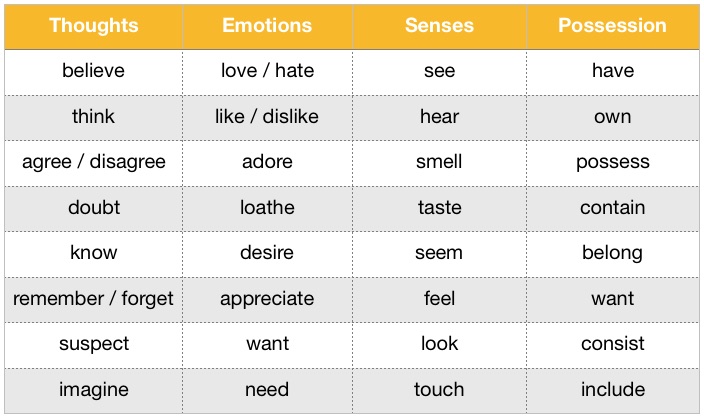- Home
- Types of Verbs
- Stative Verbs
Stative Verbs
Stative verbs (or state verbs) have the following characteristics:
- They express a state rather than an action
- They refer to thoughts, senses, emotions, feelings, and possessions
- They are not usually used in the continuous (progressive) tenses (i.e. with -ing)
- Some verbs can be used as both state verbs and action verbs
So as opposed to action verbs, they reflect a mental process rather than a dynamic activity.
For example:
I am playing football tomorrow ( = action)
I went to town yesterday ( = action)
I think I will go to town ( = a thought)
I hate spicy food ( = an emotion)
There is not one way to classify them and words could fit in various categories, but here are some common examples of stative verbs placed into four common categories:
Stative Verb Examples
Here are some stative verb sentences using these verbs. Remember these state verbs cannot be used in the continuous tenses.
Thoughts
- I think they will win the election
- I doubt she will go tonight
- She knows what the answer is
- They suspect he committed the crime
Emotions
- John loves the food
- She adores her children
- I appreciate the way you talk to me
- I need her in my life
Senses
- Yes, I see the ship over there
- He smells very bad
- If I feel the water with my hand, it is hot
- He seems very happy
Possession
- That bag belongs to me
- He has several houses
- The ticket price includes a free drink
- The smoothie consists of yoghurt, fresh banana, and lemon
Other Uses
We also use stative verbs for measurements, costs, and weights, so again these are not used in the continuous tenses:
- He weighs 190 kilograms
- This bags costs a lot
There are situations where some of the above verbs can be used in the present continuous - learn more in our present continuous lesson.
Action and Stative Verbs
Some verbs can express both an action and a state. However, they are usually being used to convey a different type of meaning in each case.
Action verbs refer to something dynamic, such as some kind of activity, rather than stative verbs, which reflect a state of mind or a mental process.
Here are some examples. As you can see, the action verbs can be in the continuous tense.
- State: I have a car ( = possession/ownership)
- Action: I'm having a good time ( = the action of enjoying oneself)
- State: I think he is too fat ( = an opinion)
- Action: I'm thinking about it ( = the actual action/process of thinking)
- State: I see you have a new coat ( = sense/perception)
- Action: I'm seeing John now ( = the action of having a relationship)
New! Comments
Any questions or comments about the grammar discussed on this page?
Post your comment here.









